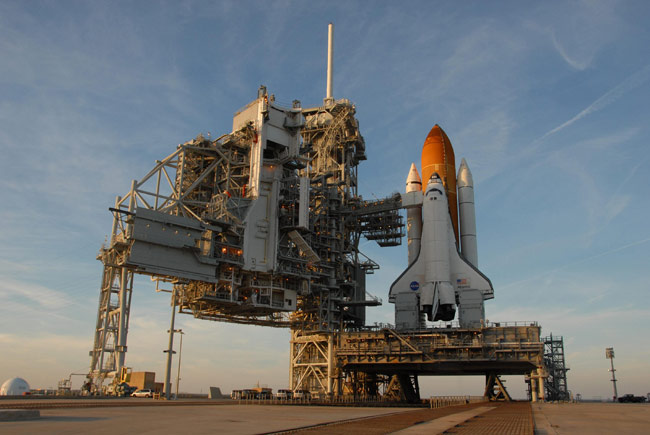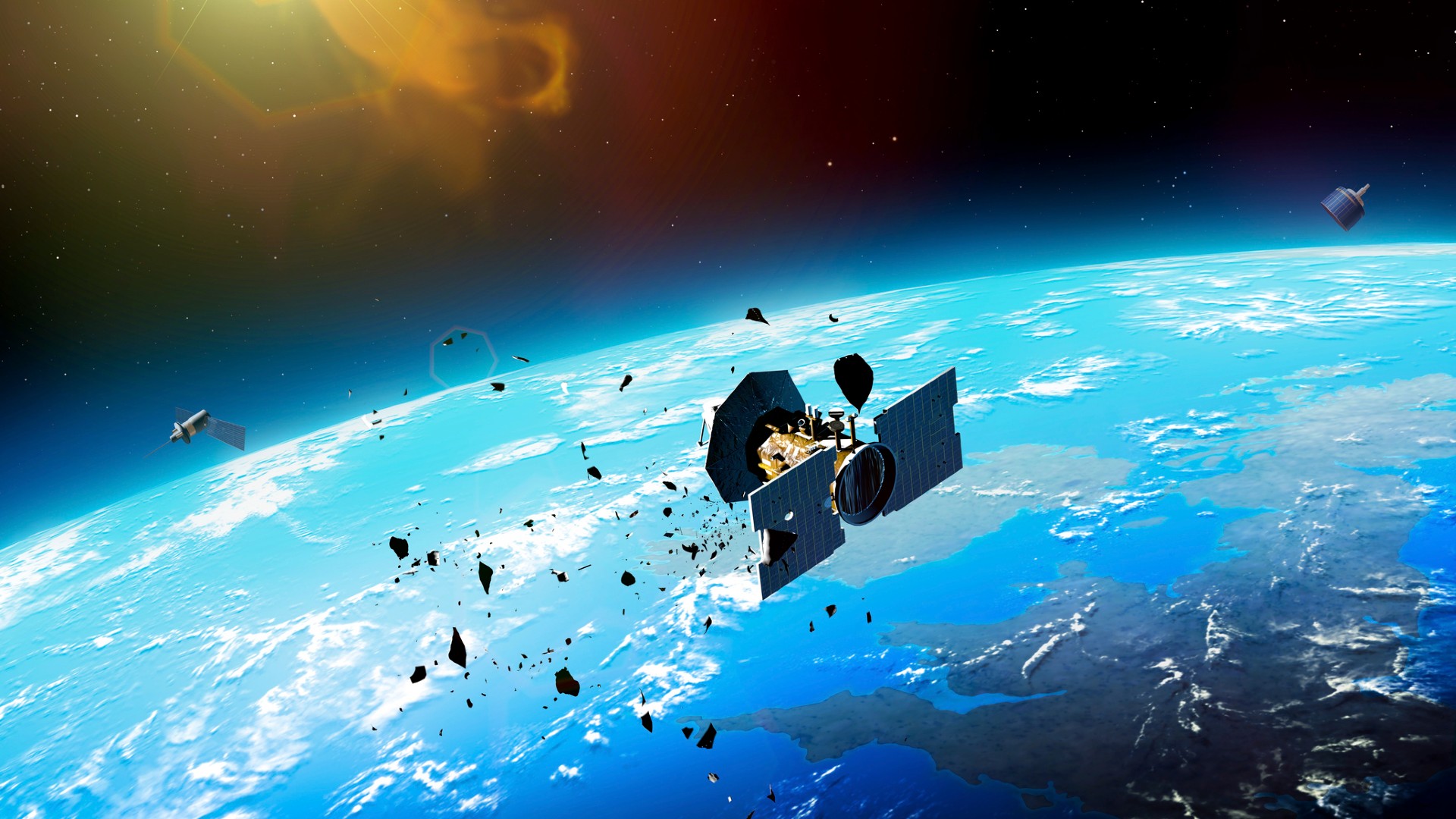NASA Renews Hunt for Shuttle Fuel Sensor Glitch

CAPECANAVERAL, Fla. - NASA is back on the trail of an erratic fuel sensor glitchthat forced the agency to delay launch plans for the space shuttle Atlantisuntil early January, mission managers said Sunday.
The failureof a fuel gauge-like sensor in Atlantis? 15-story external tank during acountdown test today forced NASA to call off a plannedafternoon launch for the second time. Engineers will now scour thesensor system in hopes of pinning down the malfunction in time for a potentialJan. 2 launch attempt.
?In thiscase, with the vehicle and the system at the pad, we feel like we need to findroot cause,? said LeRoy Cain, head of Atlantis? mission management team, afterthe launch attempt here at the agency?s Kennedy Space Center spaceport. ?Andwe?re going to make every effort to do that.?
Cain saidan engineering team is expected to draw up possible troubleshooting effortswhile Atlantis is on the launch pad and present a preliminary plan to missionmanagers on Tuesday.
Known as enginecut-off sensors, the fuel gauges monitor the levels of super-chilled liquidhydrogen and liquid oxygen propellant in Atlantis? external tank. They serve asa backup system to shut down the shuttle?s three main engines during flight before the fueltank runs dry.
During aThursday launch attempt, two of the four engine cut-off sensors monitoringAtlantis? liquid hydrogen supply failed a standard countdown test, with a third failing later. NASA flightrules require at least three working sensors to launch.
Because thesensors have behaved erratically in the past, working sometimes then failing atothers, NASA tightened its launch rules to require all four suspect units tofunction properly before Atlantis could fly. Missionmanagers also cut the shuttle?s five-minute launch window to just a single minute toconserve fuel as an extra safety measure in case the sensors failed duringliftoff.
Breaking space news, the latest updates on rocket launches, skywatching events and more!
?We gave ita good try,? said Doug Lyons, Atlantis? STS-122 launch director. ?I think theteam is disappointed, but highly motivated to go help this [engineering] teamto track this problem.?
NASA has been plaguedby intermittent glitches with shuttle engine cut-off sensors sine 2005,when the space agency resumed orbiter flights following the Columbia accident. If the engines continue tofire with a dry tank, they could rip apart and cause catastrophic damage,though several other failures in addition to the sensor glitch must occur forthat possibility, NASA has said.
Engineers,last year, switched to new engine cut-off sensors and attached additionalinstruments to monitor their performance, only to see the issues resurfaceaboard Atlantis.
?I thinkthis has been sort a cloud that has always been over us,? said WilliamGerstenmaier, NASA?s associate administrator for space operations. ?We thoughtwe had it fixed when we changed out the engine cut-off sensors before.?
Gerstenmaiersaid there is currently enough padding in NASA?s flight schedule to hunt forthe glitch and launch Atlantis? mission before the planned Feb. 14 liftoff ofthe shuttle Endeavour to carry part of Japan?s Kibo laboratory to the ISSnext year. But with up to 12 more shuttle missions on tap to complete the ISS,plus one more to service the Hubble Space Telescope, NASA hopes to settle thefuel sensor glitch once and for all in order to avoid more delays.
The agencyplans to retire its aging three-shuttle fleet by September 2010 once spacestation construction is complete.
?So thiscan be a huge advantage to us to get this understood and move forward,?Gerstenmaier said.
Commandedby veteran shuttle flyer Stephen Frick, Atlantis? seven-astronaut crew plannedto haul the European Space Agency?s Columbuslaboratory to the International Space Station (ISS) to mark NASA?s fourthconstruction flight of the year. The shuttle?s STS-122mission was slated to run about 11 days and include at least threespacewalks to attach the 1.4 billion Euro ($2 billion) Columbus lab to the ISS.
NASA had aslim, week-long window that closes Thursday in which to launch Atlantis due tothe angles between the sun and the ISS while the shuttle is docked at the spacestation. While the window reopens around Dec. 30, mission managers have saidthey would wait until Jan. 2 to avoid software concerns with flying during theyear-end change.
?We want tothank everyone who worked so hard to get us into space this launch window,?Frick and his STS-122 crewmates said in a group statement. ?We were ready tofly, but understand that these types of technical challenges are part of thespace program.?
Theastronauts will depart for NASA?s Johnson Space Center in Houston at5:00 p.m. EST (2200 GMT) and resume training for their space stationconstruction flight.
?We hopeeveryone gets some well-deserved rest, and we will be back to try again whenthe vehicle is ready,? the astronauts said.
- SPACE.com Video Interplayer: NASA's STS-122: Columbus Sets Sail for ISS
- Test Your Smarts: Space Shuttle Countdown Quiz
- VIDEO: ISS Commander Peggy Whitson Takes Charge

Tariq is the award-winning Editor-in-Chief of Space.com and joined the team in 2001. He covers human spaceflight, as well as skywatching and entertainment. He became Space.com's Editor-in-Chief in 2019. Before joining Space.com, Tariq was a staff reporter for The Los Angeles Times covering education and city beats in La Habra, Fullerton and Huntington Beach. He's a recipient of the 2022 Harry Kolcum Award for excellence in space reporting and the 2025 Space Pioneer Award from the National Space Society. He is an Eagle Scout and Space Camp alum with journalism degrees from the USC and NYU. You can find Tariq at Space.com and as the co-host to the This Week In Space podcast on the TWiT network. To see his latest project, you can follow Tariq on Twitter @tariqjmalik.
